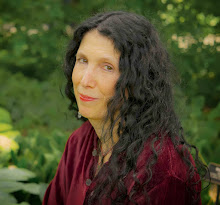

Actually looking forward to the next best thing does make things easier when you’re in a tough spot. Projecting yourself forward seems like a natural and healthy way to deal with situations over which we have little control. The problem is, of course, that I still find myself looking forward too much, versus enjoying the beauty of the moment. I have to remind myself that this is it! That said, I truly believe that there is beauty to be found in even the most ramshackle places. Learning to mine reality for its treasures was good training ground for writing!
It’s clear that the writer is born in you early, as you struggle to find reasons for what is happening to you, and as you are forced to make up stories to creditors who call. When did you begin to write and to realize that your past was something worthy of writing about?
I always enjoyed writing and language. As a high school kid, I wrote poems full of high drama and churned out story after story about runaway children and lost puppies. I didn’t start to seriously write until I had a graduate degree and a solid job in hand. I wrote about my past at first as a way to sort it all out, but when I began to share my personal writing, people responded and asked for more. But because of my past, and growing up with a mother whose energy went into painting murals on our walls at midnight versus say, meal planning; my idea of what art is and the value of things like writing was skewed in favor of gaining stability. In fact, that tension between stability and being open and risking still tugs at me.
Good question! What a great idea—to end the book when I began to write, because really that’s when I began to shed the old life to make room for the new. I should have known you when I was writing it! I ended it at graduation, because early readers didn’t seem satisfied with the ending I had. The book didn’t seem “finished” and indeed, it still isn’t in many ways. I mean, how do you pick a moment of transformation? I tried. But it felt forced. And the truth is that many people who grow up like I did aren’t “transformed” in the way of neat endings. In that way, ending the book with the future hanging in the balance seemed more real to the situation. But for a personal ending, writing is perfect; a natural ending that could have worked beautifully.
I suppose fashion was beauty to me. I love nature and artwork and poetry as an adult, but as a girl, fashion took the place of those things. I’m not sure how or why I cared about clothes or hair.No one in my family seemed to care. But I did, and it was another bridge to people and ideas that took me outside of my surroundings. And actually, those who know me will laugh because I rarely wear makeup and dressing up to me these days simply means choosing darker jeans, but back then, how things looked was important. French-braiding my hair or whipping together a 1980s-Madonna-tube-skirt were things I could do to make my world nicer. A small thing I could control. I remember debating at one point whether I should become a nun and try to save the world, or a fashion designer who could jazz up nuns’ attire, thereby improving the looks of those who save the world!
Imagination helped. And my sister Stephanie. We imagined together. And what is stronger than sharing your dreams? I cannot give enough credit to my resourceful sister. I still struggle with understanding how to transcend poverty. It seems so obvious, but we know poverty is about much more than a lack of money. Something else is missing. It has lots to do with trading in shame and invisibility for the right to feel worthy. Worthy of existing. Worthy of writing. And so on.This is a struggle for many people, of course, not just those who come from poverty. And I do believe it’s tougher for girls to break out. Not just emotionally, but physically. All too often, girls inherit the physical burden of children and caretaking which makes it easier for them to get trapped in cycles of despair and poverty. That said, boys from disadvantaged backgrounds face huge challenges. Changing a life in any meaningful way is really hard work. For anyone.
I’m working on a novel about a Niagara Falls Daredevil. Western New York has a rich history of stunting and feminism. It’s an interesting combination! And as I mentioned earlier, the idea of living dangerously (or at least audibly) versus playing it safe intrigues me. The novel is allowing me to explore what it means to put yourself out there. Literally!




3 comments:
Wow, this book sounds wonderful. I'm really impressed that after an upbringing like that, you're able to write (rather than becoming a stockbroker, as a friend who grew up in poverty quite reasonably did). Congratulations!
Talk about having a great title . . . this is one of the best I've ever seen.
Thanks so much!
Post a Comment